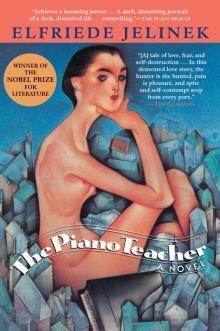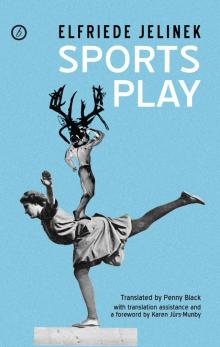- Home
- Elfriede Jelinek
Wonderful Wonderful Times Page 8
Wonderful Wonderful Times Read online
Page 8
Mother wields the threat of Father. Which merely provokes a mirthless laugh from Anna. She says: Papa would love to do it to me himself but he daren't.
Mother calms down by telling herself that the two of them are only listening to records and smoking in secret and having secret discussions about art. How is anyone expected to talk to that fellow about art!
Hans has a queasy feeling because being alone with a girl for the first time is very taxing, it's harder to get by than being with his pack of mates.
Anna eyes her face in the mirror, it is on the harsh side, she reflects that now things are becoming serious she would rather be sweet and blonde like Sophie, being harsh is more of an effort, it is difficult to keep it up. Better to snuggle up, all softness, but you must never do that or else they promptly think they can get away with anything. Her line is being hard, like Jean Seberg, that's all there is to it. She has the hots for Hans and imagines what he looks like or to be exact what he will look like in a moment. She has already seen him wearing shorts at the WAT and playing football. He must be even better with nothing on at all. He is like a wild animal, you can't win him over with talk about literature, and this appeals to her. Educated as she is, at present she is nothing but a body and must descend to the level of other bodies where she is one among many and not the best, everywhere else she is better because she has a mind. But that doesn't count now. Anna senses a certain tragedy in this, you're very naked without your head, and her head is what a woman in this situation has to lose. Anna stows her head in the bookcase and inspects Hans, who looks as if he thought he was a wild, beautifully-built animal, say a wolf. He is grinding his jaws vigorously (that old trick of his), which is meant to suggest passion, arousal, and at the same time loneliness, which John Wayne and Brian Keith and Richard Widmark and Henry Fonda are forever suggesting, over and over again. Using the selfsame methods, though better, of course. The enamel on Hans's teeth squeaks in protest at this rough treatment, the demands that are made on it are always too great. The muscles are supposed to look white from the outside, it's always worked in front of the mirror and has never failed to have its effect on a girl. Girls are impressed. However, you often don't have enough confidence, and usually the girl has even less confidence. Anna knows exactly which film that's out of. She sees the prairie before her, the horses, the log cabins, the cacti, and the lonesome men with their guns. But although she knows all about it, she still wants it, wants it. Funny. You see right through something, but you still want to check if there isn't something else behind there, something you've missed. And even if it's solely sinews, muscles and skin, that'll do fine. No stupid prattle. She herself has the brain, but now she's going to let it alone and be only a body for Hans, who has never been anything but a body.
Anna has found her passage in Bataille and is translating: Simone's mother suddenly enters the sickroom. He pulls down his trousers, because his mother is bringing the soft-boiled eggs. That's what the book says. She can't manage entirely without books. When he exposes himself (in the book), he does so because he wants his mother to leave, and because he takes pleasure in going too far. Fortunately Anna's mother is not present here in her room. And that's exactly how it is with us, Anna continues. In a minute we're going to go too far, it feels good, it says so in the book. Simply for the sake of doing it. Without any purpose. It's wrong to be wanting to achieve some aim.
Hans does not want to achieve any particular aim, all he wants is to get round Anna. Anna has a sensation of unlimited possibilities that starts in her head, it is a feeling that has often been described and Anna is emulating it so as to experience it precisely the way it is described. Without her head, Anna could not now know that she is only a body and nothing but. Anna unbuttons Hans's shirt, making brief, trembling movements because you always hear that you're supposed to tremble. Hans is trembling too, but only because what he's wearing underneath is not as clean as it ought to be, but in all the excitement this goes unnoticed. But don't think this means I love you, he says hastily. I don't love you either, at all, because you don't need love for this, declares Anna. That's news to me (Hans). Love makes a slave of you because you're always wondering where your partner is now or why he's not there. It robs you of your autonomy, it's terrible. Hans considers how best to do it and then does it. Like the aforementioned wolf, the greedy predator, he leaps on Anna's mouth and kisses it. His teeth dig around inside in premeditated fashion, the tongue ditto. It is not very skilfully done, but at least it is savage and becomes a man. Anna gropes, paws and claws at him, using her teeth and fingernails. The latter are not very long because they have to be kept short for playing the piano, a minus point. But by way of compensation things go twice as fast What you leave out in the way of pain you can make up for with speed. It's supposed to hurt because what's good is perversion, not what everybody does. What she's doing does hurt Hans and he pulls a pained face, immediately recalling as he does so that Gary Cooper also often has a pained expression on his face, suggestive of inner torment, when he is playing a love scene. You have to look as if you were doing it against your will, and then you have to screw the bint anyway because the feeling is too powerful for you. It has to engulf you, and sure enough he is promptly engulfed, the red wave, the white heat, the blackness, call it what you will, of oblivion.
What do I have to do now, Hans wonders inwardly, something always has to be happening, no tick-over pauses, it always has to be continuing, otherwise it's hard to bridge the gap, you lose the rhythm. Now I have to rip her clothes off, if she says no I mustn't take any notice. Anna is far from begging: Please don't, instead she takes her clothes off herself because Hans is clumsy. As she is slipping out of her panties, the thought goes through her head: is this why I read the whole of Sartre in my spare time, all about Being and about Nothingness? What use is it to me now? I might just as well be a girl who's never read anything but Bravo. You don't need any more for this. The fact that she perceives this distinguishes her from millions of other girls, but on the outside Hans, alas, only sees a girl the same as a million others. And he treats her accordingly. As skin, flesh, sinews, muscles and bones. Which all the others possess as well. The realisation that someone totally different (a prettier girl than herself) might just as well be lying there and that it's not at all uniquely her, Anna, comes as a cruel shock to Anna. Inside her, things are like this: she unfortunately sees through what others take in like syrup, and this torments her.
Oh, Hans, Hans, she says, in spite of herself. He accepts this without a moment's hesitation. That's his name. Yes sir! Here. All present and correct. Screwing about to commence.
Then she'll shut up at last, usually she talks too much, it's almost as bad as her brother. Hans thinks that all the talk is gradually beginning to get on Sophie's nerves too. Sophie would rather have Hans's silence, Hans the lone wolf, than all the twaddle of some Rainer who's forever looking for a group where he can shine. It's a compulsion with that character.
Come to me, come, come, come, whispers Anna, as if he weren't already doing everything in his power to come. But he keeps on wilting. It's the excitement of the great occasion, it's his first time, it can remain with you for a long time. She goes on stroking him and whispering words of love, which (incidentally) are pretty banal, she's done better in the past, she's completely changed, because right now she is a woman pure and simple and thus tends to be unoriginal. She says she really wants to have him, he's so handsome, he's handsome in her eyes even if others maybe don't see him that way because she sees him with the eyes of Love, which often deceive you, but so what. She has such feelings for him, he's under her skin, she can't get him out of her system. For him it would do if he could get a poke in her cunt but it's so difficult to get it in if it isn't quite hard, what a nuisance. The sweat is already flying from him and since it isn't working out as he would like it to he turns brutal, no, not to himself, of course not, but towards Anna.
He bends her back, kneads her, forces her head right back so her neck
makes a cracking sound, ouch you're hurting me, yes, right, I'm hurting you because I'm so strong and I don't realise I'm hurting you. You're so strong. Ah, at last, the magic word. As if he'd been started up by a code word, he manages it at last and up it comes. But the words Anna would say at other times in similar situations (such as: At last! You ready, huh?) stick in her throat, so momentous is this occasion they call Love, this thing that falls wherever it happens to fall, on soil or on a concrete ramp where it will shrivel up. and have to be thrown away. She doesn't know herself how it happened. Heavens. She goes babbling on and on about how beautiful it was and that they'll definitely have to do it more often because she liked it so much and no doubt he liked it too, didn't he, it'll get more and more beautiful as time goes by, that was just the start and if the start was so beautiful just think what the end will be like: even more beautiful. My darling, my darling, and she squeezes Hans so tight that he can't get his breath, but the main thing is that he got his jism out and put up a reasonable show in doing so. After some initial difficulties.
There is a warm feeling in Anna, and nothing else. In Hans there is a thought of Sophie, who is going to give him his first hour's coaching tomorrow. Now he gives Anna light pecks with his kisser, which is aiming now here, now there, absently and haphazardly. Anna confuses this with post-coital tenderness, which it is not and is not intended to be. On the contrary, it is solely a way of diverting attention from the fact that Hans has no tender feelings for her whatsoever, though he is glad to have got it done good and proper for once. No doubt Sophie does not want a man who is inexperienced, it's quite enough if one of them is inexperienced: her. This kind of thing can even harm a sportsman, it can reduce his fitness, and he needs to be fit for Sophie so he can conquer her in sporting style. Anna doubtless wants to do this frequently, he'll tell her she's got it wrong. She hasn't been counting on the needs of a competitive sportsman.
Hans, Hans, Hans, says Anna softly.
That's my name, all present and correct, answers Hans, laughing at his own joke.
SO THAT NATURE gets its turn as well (and so they can look out of place) the group venture forth into the famous Vienna Woods, where there is a great deal of the aforementioned Nature. In fact there is nothing else. Except day-trippers in quest of a natural way of life, since in the present age industrialisation is proceeding apace. Off the ramblers go, likewise proceeding apace.
The last scraps of morning mist are climbing the leafy slopes, and the youngsters likewise climb to the summit, where there is a tower with a view plus a cafe and restaurant, where Nature promptly comes to a well-earned stop because you can eat gateau and you are screened off behind glass. The sun enters at an angle, leaving hunks of light you have to weave your way through. The foliage of deciduous trees and various rotten stuff constitute a rustling carpet. What distinguishes the group from other groups who are out and about dressed for a ramble is that they are not dressed for a ramble, but instead they are carrying a basket containing a sack tied shut. There's an amount of scratching and whimpering going on inside the sack. This is because there is a cat in it. They caught the cat. In Jean-Paul Sartre's The Age of Reason is a character who wants to drown his cats, and so today they are planning to drown this cat too, though this cat also has a right to live. Rainer says that he himself has an equal right to non-existence, just as this cat does, this cat which he is going to assist on its way to non-existence before it can count to three. The cat has its suspicions. Hence the brouhaha in the sack.
Sophie is wearing a casual woollen dress made by Adlmuller. Anna's between-seasons coat was run up on her mother's sewing-machine, you can tell at a glance. Sophie wafts with springy step across roots, pine cones, twigs and beechnuts. Sophie is the one who has to do the drowning, in a stream in the Vienna Woods which they are still looking for. She is the only one who hasn't yet undergone the initiation. Without which she won't belong to the gang. Because once they tackle their assaults on a serious basis it will be no good her weeping and wailing like a little girl, she'll have to react coolly, impassively. Rainer takes an especial interest in Sophie's participation, since it will be something they have in common, something that will unite them.
As is well known (or rather, as is not well known, because who does know this) the Vienna Woods consist of countless hills; in among these hills there are small mounds which are neither one thing nor the other, and these are divided up by furrows along which rivulets trickle. The springs are clear and gush forth, ramblers quench their thirst there if they have one to quench. Unfortunately there is often very little water in them. Except in the spring. Which is now. Often you hear the rustle of a small animal. Busy looking for food.
The group looks for one of the fuller streams. Otherwise the drowning will take forever. And who can tell if the cat will cooperate. Sophie has long blonde hair which gleams whenever one of the slabs of light gets tangled in it; when it is in the shade it is a muted yellow, brass. Rainer has even accepted that he will cut a lesser figure here than in the jazz club, that indeed Hans, who never seems the superior, might appear a cut above him in this green spot. At least Sophie is prepared to go through with the drowning in the end. Anna stays apart from the others, occupied with not showing that there is now a bond between her and Hans that can never be cancelled, the indifference in her features is a product of long practice. Just now he wanted to kiss her. Nothing doing. Tenderness is for kids.
Still, when she looks at him a tremor goes through her. Prompted by the memory of desire. If mere memory can send a tremor through her, what will it be like in reality?
Was that an animal wailing? No, ramblers making jubilant noises. Hallo! Hallo! They have startled the animals, these fat men and women with jobs for life who can finally do something with neither point nor purpose, that is to say: climb mountains. The Sophienalpe, the Schopfl, the Satzberg. In sporty outfits that generally strike weird Styrian notes. But they are city-dwellers and their rural enthusiasms are a token of affluence, because they no longer have to live in the country, nor in squalor. And how good they look in their Tyrolean hats!
They scatter leftover food around and are destroying a natural, organic environment, making it artificial, though this is a problem Anna and Rainer are not used to perceiving, since they, after all, are out to spread artifice anywhere and everywhere, as far as possible. Cheap sunglasses hide their pale, bleary-eyed faces, Rainer's nicotine-yellow fingers twitch in the direction of cigarettes, to start a forest fire. Birds utter penetrating cries. Leaves flutter down. Trains whistle in the distance. Sunday.
Anna talks of Schonberg's Verklarte Nacht.
Wrong place. Wrong time.
In this wondrous daylight you go on about night, and not even a real night but one that's been worked over in musical form, says Sophie with a bemused smile. Hans is shadow-boxing the whole time and contesting imaginary wrestling matches and playing football, he thinks no further than the tip of his nose or as far ahead as his arms reach. He is totally in the now. He is a man of the present. The pussy-cat in the sack is not present to his mind either. That is the future. Just don't think about it. He demonstrates how to fool a footballer on the other team and dribble your way past him, he also acts out the other player, no doubt Sophie thinks he is terrific. Sophie is enjoying the sunshine and the fresh air, though she is able to enjoy these for several hours every day on horseback or in some similar way. If you are to enjoy something you must first be familiar with it. The twins are not altogether in their element. Their lungs are rattling. They have none of that fitness and stamina Hans has so much of. Too much alcohol, too many cigarettes, boasts Rainer, and he tries to start a debate about Camus, to show himself in a favourable light. Sophie wants to go in the real light that's favourable for getting a tan. Hans wants to show Sophie a number of judo stunts a friend taught him. Soon they are tussling and laughing. This hits Rainer's and Anna's guts like poison. Anna hastens to assert that she is now practising the Berg piano sonata, a goal she has long been aiming a
t, and now she's reached it. It is extremely demanding but she will meet the challenge in the end. Can you eat that, asks Hans, and he neighs like a Lipizzaner stallion. Have you heard this or that or the other record, Anna? No, because that is low-brow music, you have to learn some more, Hans, or else you'll be left standing where you are, and at your present stage you mustn't do that on any account because otherwise you'll be left where there is nothing at all. Sophie's parents have season tickets to the Philharmonic. Often Sophie goes with her mother, just the two of them. Sophie's mother is an acknowledged society beauty, everyone knows her, everyone says hello, needless to say only in those places where everyone knows everyone else. I bet she has no values, says Rainer, who has merely seen her, he is of the opinion that she has no standards at all, she doesn't need any. She goes drifting about among great sterile transparent jellies. Nothing keeps her steady and stable, but the glass-bright mass keeps her in a constant state of suspension, she doesn't touch the ground. Sophie too will be like that one day, if something isn't done to prevent it in good time, now. Love will prevent it.
The Philharmonic only play reactionary stuff like Schubert, Mozart and Beethoven, spits Anna. When they heard Webern last Sunday they applauded like idiots, but the fact is they despise music like that. The audience the Philharmonic gets is too well-bred to boo a Webern, they know how highly-rated a composer he is, replies Sophie. But of course they don't like him. Webern's work is a joke from start to finish.
Hans enthusiastically points out a squirrel, a red one. Red all over, really. What a dear creature. It races up and down the tree trunk, its eyes are bright. The sun struggles across the sky. Little midday clouds put in their appearances. Let's hope they won't gather into dark cloud-banks. Here at last is a stream of some size that may be suitable for the drowning of cats, no, definitely is suitable.

 The Piano Teacher
The Piano Teacher Sports Play
Sports Play Lust
Lust Greed
Greed Wonderful Wonderful Times
Wonderful Wonderful Times